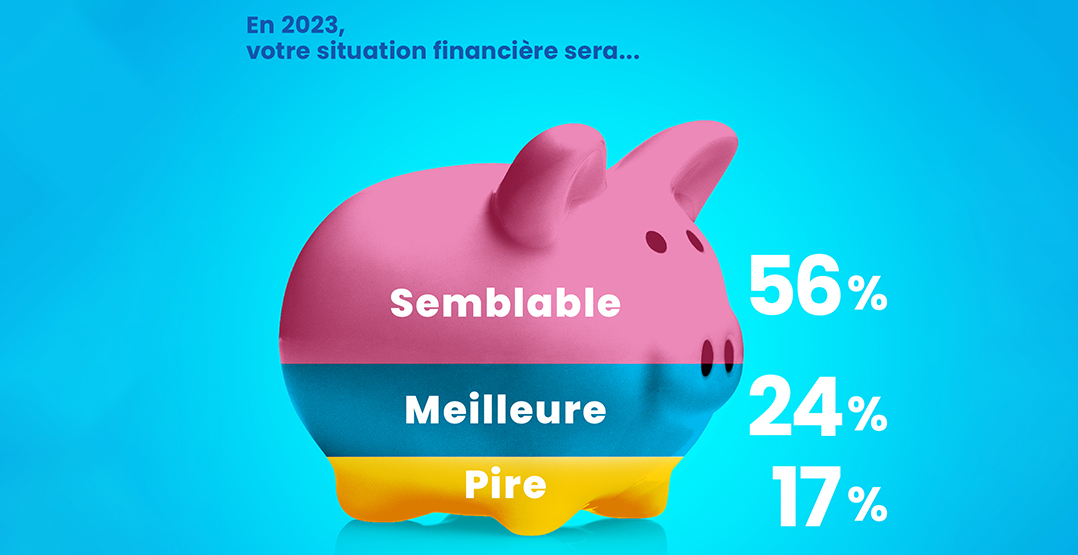Current economic situation: Quebec workers are worried and pessimistic, according to an ÉducÉpargne/Chambre de la sécurité financière survey

Montreal, October 1, 2022 – ÉducÉpargne and the Chambre de la sécurité financière (CSF) have unveiled the results of their first joint survey, conducted in collaboration with Léger. The main objective of the survey was to better understand the perceptions and behaviour of Quebec workers in light of the current economic situation.
Among other findings, the survey demonstrates that 85% of Quebec’s workers are very concerned (39%) or somewhat concerned (45%) about the current economic situation. With regard to the evolution of their financial situation in 2023, 56% think it will be similar to their current situation, while 17% think it will be even worse.
“We undertook this collaboration with ÉducÉpargne to inform our members on the current situation of Quebec consumers. However, given Quebec workers’ level of financial anxiety, we want to remind everyone that advisors regulated by the CSF have major ethical obligations towards their clients, including looking after their best interests as a function of their financial situation and their objectives. The mission of the CSF is important: to ensure the protection of the public by promoting ethics, discipline and continuing education among advisors offering financial products and services to the public in Quebec.” states Me. Marie Elaine Farley, CSF President and Chief Executive Officer.
Additionally, while simultaneously experiencing the difficult economic situation and the continuation of the COVID‑19 pandemic, Quebec workers are more concerned about the economic situation (69%) than by the pandemic (14%).
A majority of Quebec workers are making concrete efforts
More than half (55%) of Quebec workers have made concrete efforts in light of their current financial situation. Of this group, 64% reduced restaurant outings, 62% reduced leisure expenditures, 49% limited travel and gasoline consumption and 46% reduced their grocery purchases.
Regarding savings, 20% of respondents making changes said they increased their saving, while 23% reduced it.
“In contrast to what we might have thought, we were pleasantly surprised that saving levels were not greatly affected by the situation. Since saving is the basis for everything related to long‑term financial health, Quebec workers have demonstrated good reflexes, even in the most difficult situations. It’s worth noting that people generally preferred to reduce their expenditures rather than their savings,” concludes Nathalie Bachand, financial planner and chair of the board of ÉducÉpargne.
Survey methodology
This Web survey of 1,000 Quebec workers aged 18 and over was conducted by Léger from August 9 to 16, 2022. For information purposes a random sample of 1,000 respondents would have a maximum margin of error of 3.1%, 19 times out of 20.
October is Savings Month
In October, ÉducÉpargne will specifically focus on young workers, aged between 18 and 40, to sensitize them to the importance of saving and its medium‑ and long‑term benefits. In addition, two $1,000 TFSAs will be awarded in an online draw.
ÉducÉpargne would like to thank its invaluable partners who made this campaign possible: Beneva, Fondaction, le Fonds de solidarité FTQ and Retraite Québec. For more details, go to www.educepargne.ca.
About ÉducÉpargne
Created in 2003 under the name Question Retraite, ÉducÉpargne is a non-profit organization that brings together more than 20 partners from a range of sectors including government, finance, business, education and the community. ÉducÉpargne’s mission is to make Quebecers aware of the importance of developing and maintaining good saving habits, provide them with the tools they need to broaden the scope of their savings, and advise them on how to make the most of their savings, especially in retirement.
About the Chambre de la sécurité financière
The Chambre de la sécurité financière's mission is to protect the public by regulating all aspects regarding mandatory continuing education, ethics and discipline of its 32,000 members, who include financial security advisors, group insurance and group annuity plans advisors, financial planners, mutual fund dealer representative and scholarship plan dealer representatives. www.chambresf.com
– 30 –
Sources: ÉducÉpargne and the Chambre de la sécurité financière
Information and interview requests:
Louis‑Alexandre Lacoste Geneviève Fontaine
General Manager Senior communications advisor
ÉducÉpargne Chambre de la sécurité financière
514‑953‑5188 514‑434‑2347
dg@educepargne.ca gfontaine@chambresf.com